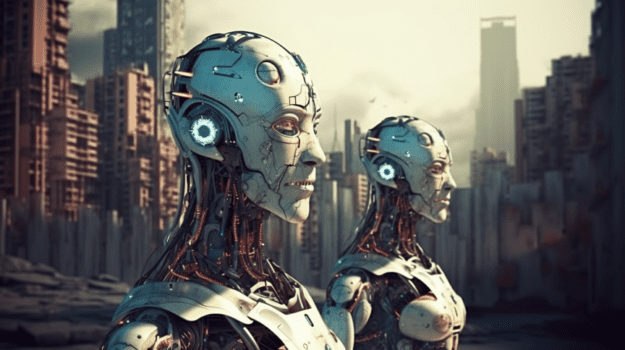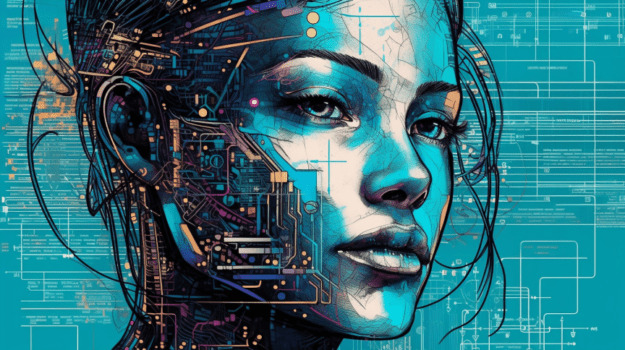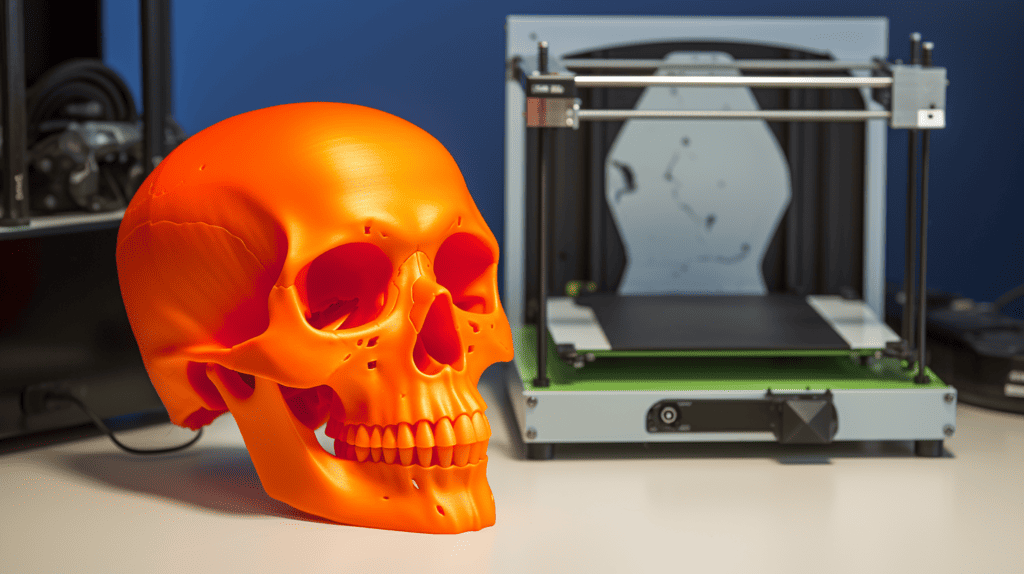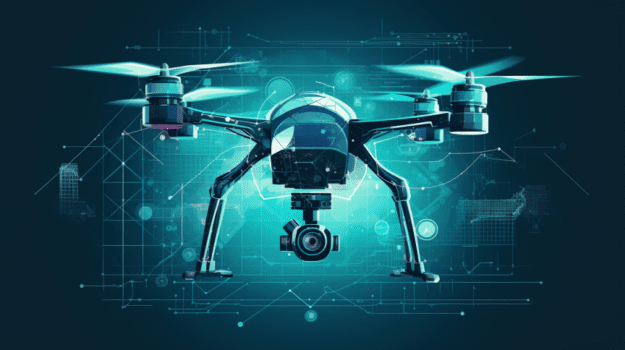Last Updated on July 6, 2023 by Said Al Azri
Introduction
In the rapidly evolving landscape of education, Artificial Intelligence (A.I.) is emerging as a transformative force, revolutionizing how we teach and learn. A.I., a branch of computer science that simulates intelligent human behavior, has found its way into classrooms, bringing personalized learning, data analytics, and enhanced teacher support. In this article, we will explore the profound impact of A.I. on education and its potential to shape the future of learning.
A.I. in the Classroom

In an era of personalized experiences, A.I. is transforming the traditional classroom setup. Adaptive learning algorithms analyze students’ strengths, weaknesses, and learning styles to deliver tailored educational content. This individualized approach maximizes student engagement and learning outcomes. A.I.-powered systems can provide real-time feedback, assess progress, and recommend personalized learning paths, empowering students to take charge of their education.
One notable application of A.I. is virtual tutors. These digital assistants leverage natural language processing and machine learning algorithms to interact with students, answering questions, explaining concepts, and providing guidance. While A.I. tutors offer personalized support and instant feedback, they are not intended to replace human teachers. Rather, they complement classroom instruction and bridge learning gaps.
A.I. and Curriculum Development

A.I. algorithms are revolutionizing curriculum development by enabling the creation and improvement of educational content. By analyzing vast amounts of data, A.I. can identify knowledge gaps, assess the effectiveness of instructional materials, and provide recommendations for improvement. This data-driven approach ensures that curricula are up-to-date, aligned with learning standards, and cater to the needs of individual learners.
Furthermore, A.I. allows for the development of adaptive assessment strategies. Traditional assessments often follow a one-size-fits-all approach, but A.I. enables dynamic and personalized assessments tailored to each student’s proficiency level. These adaptive assessments adjust the difficulty of questions based on the student’s responses, providing a more accurate measure of their knowledge and promoting deeper learning.
Data Analytics and Predictive Modeling

Data analytics plays a crucial role in education, and A.I. enhances its potential. By collecting and analyzing vast amounts of data, A.I. can uncover valuable insights about student performance, engagement patterns, and learning preferences. Educators can leverage this information to make data-informed decisions, identify struggling students, and implement targeted interventions.
Predictive modeling, powered by A.I., takes data analytics a step further. By examining historical data and patterns, predictive models can forecast student outcomes, identify potential areas of improvement, and provide early interventions. This proactive approach allows educators to address challenges before they become significant obstacles to a student’s progress.
While data analytics and predictive modeling offer significant benefits, it is essential to prioritize data privacy protections. Safeguarding student information and ensuring ethical data practices should be integral to any A.I.-driven education system.
A.I. for Teacher Support

A.I. technology has the potential to support and enhance the work of educators. By automating administrative tasks, such as grading assignments and generating reports, A.I. reduces the time teachers spend on administrative work, allowing them to focus more on instruction and student support.
Real-time feedback is another area where A.I. excels. A.I.-powered systems can analyze student responses and provide immediate feedback, helping teachers identify misconceptions, tailor their instruction, and address individual student needs promptly. This feedback loop facilitates more personalized and effective teaching.
A.I. also holds promise in improving parent-teacher communication. Chatbots or virtual assistants can provide parents with real-time updates on their child’s progress, upcoming assignments, and areas for improvement. These automated systems foster better collaboration between parents and teachers, creating a supportive learning environment for students.
A.I. and the Future Job Market

The integration of A.I. in education raises questions about its impact on job opportunities for teachers. While A.I. technology automates certain tasks, it also creates new opportunities and demands in the education sector. Teachers can focus on more meaningful interactions with students, mentoring, and designing innovative learning experiences that harness the power of A.I.
Moreover, A.I. equips students with essential skills for the future job market. As automation and A.I. become more prevalent in various industries, nurturing skills such as critical thinking, problem-solving, creativity, and adaptability becomes crucial. A.I.-infused education can provide students with the necessary competencies to thrive in a technology-driven world.
The unfolding job market requires a reevaluation of traditional roles and a focus on lifelong learning. As A.I. advances, educators must adapt and acquire new skills to effectively utilize A.I. technology and support students in developing A.I.-related skills.
In the next sections, we will explore the global impacts and inequalities of A.I. in education, the ethical implications, the intersection of A.I. and the arts, and the future possibilities for A.I. in education.
Global Impacts and Inequalities

While A.I. presents immense potential for education, it also raises concerns about access and equity. The implementation of A.I. in education must address potential inequalities in access to technology. Without proper measures, there is a risk of exacerbating the digital divide and marginalizing underrepresented groups. It is crucial to ensure that all students, regardless of socioeconomic background or geographical location, have equal opportunities to benefit from A.I.-driven educational tools and resources.
On a global scale, A.I. has the power to transform education in underserved regions. A.I.-powered platforms can deliver educational content, personalized instruction, and mentorship to areas with limited access to traditional educational resources. This has the potential to bridge the educational gap and empower learners worldwide.
Striking a balance between the advantages of A.I. in education and addressing potential inequalities requires a thoughtful and inclusive approach. Policymakers, educators, and technology developers must collaborate to ensure equitable access and opportunities for all learners.
Ethical Implications of A.I. in Education

As A.I. becomes more prevalent in education, it is essential to consider the ethical implications. A.I.-driven systems collect and process vast amounts of data, raising concerns about data privacy, security, and potential misuse. Safeguarding student information and ensuring ethical data practices should be a top priority.
Transparent decision-making processes are vital to address ethical concerns. The development and deployment of A.I. systems in education should involve stakeholders, including educators, students, parents, and policymakers. Establishing ethical guidelines and standards for the use of A.I. in education can help navigate potential challenges and ensure responsible and ethical implementation.
Ethical considerations extend beyond data privacy. A.I. algorithms must be designed to avoid biases, discrimination, or perpetuation of social inequalities. It is essential to continually monitor and evaluate A.I. systems to ensure fairness, transparency, and accountability.
The Intersection of A.I. and the Arts

While A.I. is often associated with technical domains, it also intersects with the arts, offering unique opportunities for creative expression and exploration. A.I. can generate music, produce visual artwork, and contribute to the development of new media forms.
In the realm of music, A.I. algorithms can compose original pieces, mimic the styles of renowned composers, or facilitate collaborative music creation. This technology opens doors for experimentation and innovation, pushing the boundaries of what is creatively possible.
In visual arts, A.I.-powered systems can generate images, assist in the creation of visual effects, and even contribute to the design of architectural structures. This fusion of human creativity and A.I. capabilities enables artists to explore new artistic territories and create thought-provoking works.
The emergence of A.I. in the arts challenges our notions of creativity, authorship, and the role of human artists. It sparks conversations about the symbiotic relationship between human imagination and machine-generated art.
Future Possibilities for A.I. in Education

As A.I. continues to evolve, its potential in education expands exponentially. Looking ahead, we envision a future where A.I. transforms the classroom experience in even more profound ways.
Advancements in hardware and software will enable more sophisticated A.I. systems that can process complex data, provide highly accurate assessments, and offer truly adaptive learning experiences. Virtual reality (VR) and augmented reality (AR) technologies, combined with A.I., will create immersive and interactive educational environments, allowing students to explore concepts and scenarios with unparalleled depth.
Furthermore, A.I. has the potential to facilitate lifelong learning. Intelligent tutoring systems can continue to support learners beyond the classroom, providing personalized guidance and resources for skill development throughout their lives. A.I.-powered career coaching can assist individuals in navigating the ever-changing job market, identifying opportunities, and acquiring the necessary skills for future employment.
The future of A.I. in education is dynamic and promising. It holds the potential to revolutionize not only how we teach and learn but also how we prepare individuals for a rapidly evolving world.
Challenges to A.I. Implementation

Implementing A.I. in education is not without its challenges. As with any emerging technology, several obstacles must be overcome to fully realize the potential of A.I. in educational settings.
One significant challenge is ensuring that educators possess the necessary proficiency to effectively integrate and utilize A.I. tools and platforms. Professional development programs and ongoing support should be provided to empower teachers to leverage A.I. technology for instructional purposes.
Another challenge is the cost associated with implementing A.I. systems. A.I.-powered tools and platforms often require substantial investment in infrastructure, software, and training. Ensuring equitable access to A.I. technology across different educational institutions and regions is vital.
Additionally, addressing concerns around data privacy and security is crucial. Strict protocols should be in place to protect student data, including encryption, secure storage, and compliance with data protection regulations. Transparent data usage policies and obtaining informed consent are essential to build trust between educational institutions, students, and parents.
Navigating these challenges requires collaboration among stakeholders, including policymakers, educators, technology developers, and students themselves. It is through collective efforts that the full potential of A.I. in education can be realized.
A.I. and Higher Education

A.I. technology has significant implications for higher education as well. Colleges and universities can leverage A.I. to enhance the learning experience, support research initiatives, and improve administrative processes.
Within the realm of teaching and learning, A.I. can facilitate adaptive instruction, providing personalized pathways for students in higher education. A.I.-powered systems can analyze student performance, offer tailored recommendations, and provide real-time feedback, enhancing the effectiveness of instruction. Moreover, A.I. can aid in the development of intelligent tutoring systems for advanced subjects, helping students navigate complex concepts and master challenging material.
In research, A.I. can play a transformative role. A.I.-driven algorithms can analyze vast amounts of data, identify patterns, and support data-driven research inquiries. From scientific discovery to data analysis, A.I. technology has the potential to expedite research processes and generate insights that were previously unattainable.
Administratively, A.I. can streamline routine tasks, such as enrollment management, scheduling, and academic advising. Chatbots and virtual assistants can assist students with inquiries, guide them through administrative processes, and provide timely information. This automation allows higher education institutions to allocate resources more efficiently, enhance student support services, and improve overall operational efficiency.
A.I. and Its Role in STEM Education

Science, technology, engineering, and mathematics (STEM) education can greatly benefit from the integration of A.I. A.I.-powered tools can engage students in hands-on experimentation, data analysis, and problem-solving activities. Virtual laboratories and simulations can provide realistic environments for students to explore scientific phenomena and develop their analytical skills.
A.I. algorithms can assist in the identification of patterns within complex datasets, enabling students to make data-driven conclusions. Machine learning techniques can enhance the understanding of mathematical concepts through adaptive and personalized instruction.
Preparing students for careers in A.I. and other STEM fields is crucial in a technology-driven world. By integrating A.I. into STEM education, students can develop skills in computational thinking, data analysis, and algorithmic problem-solving, laying the foundation for future success in STEM careers. It is important to address the ethical implications of A.I. and promote responsible and ethical use of technology in STEM education.
Investing in A.I. and Education

Investment in A.I. technology is essential to realize its transformative potential in education. Allocating resources to research and development of A.I.-powered educational tools and platforms can lead to improved learning outcomes, enhanced student engagement, and increased efficiency in educational processes.
State-funded investments in A.I. technology can play a vital role in creating equitable access to quality education. By providing financial support to educational institutions, policymakers can ensure that A.I. tools and resources are available to students from all socioeconomic backgrounds, narrowing the digital divide.
While investing in A.I. technology is crucial, it is equally important to consider ethical considerations and the long-term sustainability of A.I.-driven education. Funding should be directed towards addressing data privacy concerns, developing robust security measures, and promoting responsible use of A.I. technology in educational settings.
The Future of A.I. in Education: Expert Predictions

Experts in the field of A.I. and education have made various predictions about the future of A.I. in educational settings. These predictions envision a range of possibilities, including adaptive learning experiences, personalized virtual tutors, intelligent assessment systems, and the seamless integration of A.I. technology into educational environments.
While these predictions provide insights into the potential direction of A.I. in education, it is essential to evaluate their feasibility and consider the challenges that may arise. Ongoing research, collaboration among stakeholders, and a comprehensive understanding of educational contexts are crucial in turning these predictions into reality.
Conclusion

The integration of A.I. technology into education is reshaping the way we teach and learn. From personalized instruction to data analytics, A.I. holds the potential to enhance educational experiences, support student success, and address pressing challenges in education.
However, the responsible and ethical implementation of A.I. in education is paramount. Striking a balance between harnessing the benefits of A.I. technology and addressing concerns around privacy, equity, and ethics is crucial.
As we move forward, it is important for educators, policymakers, researchers, and technology developers to collaborate and navigate the complexities of integrating A.I. into educational systems. With thoughtful planning, ongoing dialogue, and a commitment to providing equitable access to quality education, we can unlock the full potential of A.I. and pave the way for a future where education is enriched by intelligent technology.
Pertinent FAQs

1. Common questions regarding the implementation of A.I. in education:
– How can A.I. personalize instruction for individual learners?
– What are the potential risks and challenges associated with A.I. in education?
– How can educators ensure that A.I. tools and platforms are effective and reliable?
– What are the ethical considerations of using A.I. technology in educational settings?
2. Ethical concerns about A.I. and education:
– How can student data privacy be protected when using A.I. technology in education?
– What measures can be taken to avoid bias and discrimination in A.I.-driven educational systems?
– How can transparency and accountability be ensured in the development and deployment of A.I. algorithms in education?
3. What steps can be taken now to prepare educators and students for a world of A.I.?
– Providing professional development opportunities for educators to enhance their understanding of A.I. and its applications in education.
– Integrating A.I.-related concepts and skills into the curriculum to equip students for the future job market.
– Encouraging critical thinking and ethical considerations when using A.I. technology in educational contexts.
Additional Resources

Organizations and groups working to promote A.I. in education include:
– The Partnership on AI in Education
– The International Society for Technology in Education (ISTE)
– The UNESCO Mahatma Gandhi Institute of Education for Peace and Sustainable Development (MGIEP)
These additional resources can provide valuable insights into the current trends and future directions of A.I. in education.
Glossary

– A.I.: Artificial Intelligence
– STEM: Science, Technology, Engineering, and Mathematics
– VR: Virtual Reality
– AR: Augmented Reality






